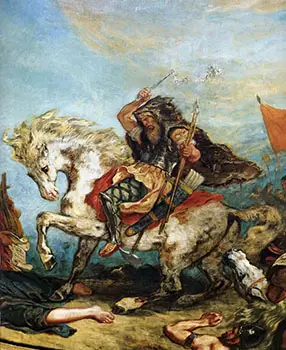Attila The Hun
Attila was the ruler of Hunnic Empire during the early 5th century. He is widely regarded as one of the most influential military leaders of the history. His empire comprised of areas of Central and Eastern Europe.
Hunnic empire was a union between Huns, Ostrogoths and Alans. Attila was the fiercest enemy of both Western and Eastern Roman Empire and repeatedly waged war against them, till he met his maker. He crossed Danube River twice to ransack the Balkans. Attila invaded Italy and France as well. He was named Scourge of God for his fierce and ruthless plunder of European cities.


Early Life: Attila was born in a noble Hun family. Huns were nomadic people who had migrated from the areas east of Volga River in Russia to Eastern Europe. His father, Mundzuk was brother of Hun Kings Ruga and Octar. Attila’s birth year is not known for certain. While some historians believe that he was born in 395 AD, others have claimed that the year of his birth was 390 AD.
Attila and his brother were schooled in military arts from the early childhood. Huns were expert horsemen and archers. They were also expert javelin throwers. Attila was also taught Latin and Gothic languages. Very little is known about the early life of Attila and the circumstances leading to his accession after his uncle’s death are also not known. However, historians believe that Attila and his brother Bleda were groomed for a leadership role from their early years.

Attila’s Reign: After the death of their uncle Ruga, Attila and his brother Bleda emerged as joint leaders of Huns in 434 AD. The brothers together, made life very difficult for both Eastern and Western Roman Empires. Immediately after taking over Attila and Bleda forced Eastern Roman Empire to agree over a treaty. As per the treaty Romans increased the tribute amount to Huns and returned Huns fugitives as well. After this treaty, Attila turned towards Sassanid Empire and invaded vast tracts of the empire. In 440 AD however; they were defeated at Armenia by Sassanid army.
As a result, Huns retreated to Europe and initiated invasion of cities along Danube River. They plundered city of Illyricum and Viminacium. While Attila’s army was busy in plundering cities along Danube, Romans faced stiff challenge from Vandals, who invaded the all important Western Roman province of Carthage. Romans were forced to deploy majority of their troops to retake Carthage from Vandals. This presented Attila and Bleda, a godsend opportunity to take Balkans. Huns invaded Balkans in 441 AD and laid waste to almost all major cities in Balkans.
In 442 AD, Romans decided to take back their territory from Huns, but they faced several crushing defeats against determined and stronger Huns and after an eventual defeat near Callipolis, accepted defeat. Attila imposed very harsh peace terms. Huns retreated to their territory for the time being after that. In 445 AD, Bleda died, leaving Attila as the sole ruler of the Hunnish Empire. Attila subsequently entered in a series of conflicts against Romans and was defeated in the Battle of Chalons. He retreated leaving Romans as victors.
In 452 AD he again started an invasion and on his way plundered Italy. The residents of the areas he ransacked took refuge in small islands which is how the city of Venice was founded. His invasion ended in a treaty with Romans. Attila was planning to invade Constantinople in 453 AD, when he died suddenly.

Death: The exact circumstances of Attila’s death are widely debated among historians. Some believe that he died while celebrating his latest marriage. Others believe that he died as a result of internal bleeding caused by excessive drinking.
There is yet another theory which claims that Attila was killed by his wife, Gudrun. After his death, The Hunnic Empire could not survive for long. One of his confidants, Ardaric of Gepids led an uprising against Hunnic rule and caused rapid collapse of the empire.




